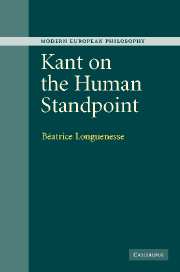Book contents
- Frontmatter
- Contents
- Acknowledgments
- Introduction
- PART I Revisiting the capacity to judge
- PART II The human standpoint in the Transcendental Analytic
- Part III The human standpoint in the critical system
- 8 The transcendental ideal, and the unity of the critical system
- 9 Moral judgment as a judgment of reason
- 10 Kant's leading thread in the Analytic of the Beautiful
- Bibliography
- Index of citations
- Index of subjects
8 - The transcendental ideal, and the unity of the critical system
Published online by Cambridge University Press: 22 September 2009
- Frontmatter
- Contents
- Acknowledgments
- Introduction
- PART I Revisiting the capacity to judge
- PART II The human standpoint in the Transcendental Analytic
- Part III The human standpoint in the critical system
- 8 The transcendental ideal, and the unity of the critical system
- 9 Moral judgment as a judgment of reason
- 10 Kant's leading thread in the Analytic of the Beautiful
- Bibliography
- Index of citations
- Index of subjects
Summary
Kant starts the exposition of the Transcendental Ideal, in the Critique of Pure Reason, by stating what he calls the “principle of complete determination” in the following terms: “Every thing … as to its possibility … stands under the principle of complete determination [durchgängigen Bestimmung], according to which, among all possible predicates of things, insofar as they are compared with their opposites, one must apply to it” (A572/B600). This principle is susceptible to different interpretations. I suggest it has, according to Kant, a legitimate, critical interpretation, which emerges from the Transcendental Analytic as a whole. I shall consider that interpretation in a moment. But it also has an interpretation in the context of rational metaphysics, from which Kant inherits the principle in the first place. In this context, “complete determination” means complete determination by the intellect alone. As it gradually appears while we progress through section two of the Transcendental Ideal, this interpretation is one to which reason, according to Kant, is inevitably drawn, and which leads to the dialectical reasoning that Kant calls the “Transcendental Ideal,” in accordance with the illusory principle stated at the beginning of the Transcendental Dialectic: “If the conditioned is given, then the totality of its conditions is also given.” In this case: if limited realities are given, then the absolutely unlimited totum realitatis is also given. This totum realitatis is then posited as a distinct being, the ground of all finite reality: the ens realissimum of rational theology.
- Type
- Chapter
- Information
- Kant on the Human Standpoint , pp. 211 - 235Publisher: Cambridge University PressPrint publication year: 2005
- 2
- Cited by



